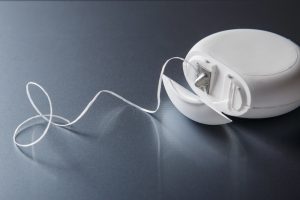
Dental implants in Houston are a great investment in your oral and overall health. Taking good care of your replacement teeth is important for ensuring that they stand the test of time. That involves brushing and flossing regularly — but when it comes to the latter, you may find it difficult to adjust to the proper technique to really clean around your implants. Would you like some guidance on this aspect of your oral hygiene routine? Keep reading below for more information on whether you should floss your implants and how you can do so safely.
Should You Floss Your Dental Implants?
Before delving into the details of how to floss your replacement teeth, it is important to consider whether you should floss around them at all. Some experts say no, while others feel emphatically that flossing is key to maintaining your smile’s health.
The Pros of Flossing Your Dental Implants
Whether it’s intentional or just forgetfulness, many people neglect proper flossing habits. Unfortunately, not cleaning between your natural teeth with dental floss can lead to plaque and tartar buildup that increases the risk of gum disease, root decay, and other oral health hazards.
According to many oral health professionals, the need to floss is just as important once you have had dental implants placed. It is true that prosthetic teeth cannot develop cavities, but keeping your gums and the teeth around the implant healthy will help you enjoy continued oral health and prevent further tooth loss. Flossing might even prevent infections around your implants and lower the risk of implant failure.
The Potential Cons of Flossing Your Implants
While you should certainly continue to floss all of your natural teeth, there are a few reasons why some experts recommend against flossing dental implants:
- Floss shreds. It may leave tiny particles behind that contribute to peri-implantitis, an infection that often leads to implant failure. Some dentists recommend using an interdental brush (a tiny toothbrush) to clean around implants instead of floss. An oral irrigator, also called a water flosser, may be another suitable option.
- You might damage the peri-implant seal. When you are flossing your natural teeth, you can push the floss beneath your gumline without causing damage. That is because you have a tough periodontal ligament that is resistant to the pressure of the floss. Implants, however, do not have that ligament. Rather, they have a peri-implant seal, which is rather weak. Floss may damage it.
How to Floss Dental Implants
It is possible to floss safely with dental implants. If you are unsure of proper technique, ask an experienced dental hygienist for a hands-on demonstration. It would also be smart to ask for product recommendations. There are many different types of floss on the market, and not all of them are suitable for use with implants.
In the meantime, you can read the tips below to get an idea of how to clean around your implants without accidentally causing damage.
- Take 12 to 18 inches of dental floss and wrap it around your middle fingers, leaving a space about 2 to 3 inches wide in between to work with.
- Slide the dental floss up and down between the teeth, rubbing along the side of the dental implant and crown. Do not push the floss into your gumline, and never “snap” the floss between your teeth. Gentleness is vitally important.
- Work the floss around the base of each tooth, creating a C shape as you clean both your natural teeth and your dental implant restorations.
- After you have cleaned between and around two teeth, gently work the floss up and out.
- Move onto a clean section of floss and repeat the process throughout your mouth.
Patients with dental implants should floss their teeth at least once daily. It is best to do so before brushing because removing plaque from between your teeth will allow the fluoride in your toothpaste to be as effective as possible.
Also, keep in mind that if you are new to flossing, your gums may bleed a bit at first. In most cases, this is nothing to worry about. As your mouth adapts to your new oral hygiene routine, it should become easier and easier to maintain a fresh and clean smile.
Questions about Dental Implant Maintenance?
With proper care and maintenance, dental implants can usually be expected to last for a lifetime. If you have questions about how to clean your prosthetic teeth, do not hesitate to ask your dentist or oral surgeon. They want to help your restored smile thrive for as long as possible!
Meet the Practice
Piney Point Dental Implant Center offers high-quality oral surgery services, including dental implants. Dr. Steve Koo reminds patients that excellent oral hygiene practices are important for protecting prosthetic teeth. To learn more about how to properly brush and floss dental implants or to ask anything else, do not hesitate to get in touch with us at 713-597-7340.

